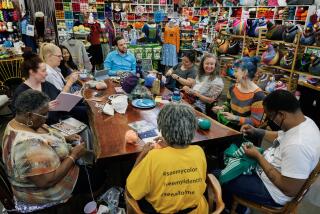In Knitting Circles, Women Weave Their Prayers Into Cloths of Comfort
- Share via
HARTFORD, Conn. — When Elaine Wiatr’s friend lost her husband to suicide, she felt words wouldn’t be enough. To show her concern, she gave her a hand-knitted shawl.
When she presented the purple shawl to her friend, fellow parishioner Jeanne Ebaugh, she knew it was right. Ebaugh took a deep breath, and Wiatr sensed an almost immediate calming.
“Jeanne picked it up and wrapped it around herself. It was like she was being wrapped in comfort,” said Wiatr.
The shawl was made by a prayer shawl ministry group from their parish, St. Patrick-St. Anthony Church in Hartford. The group has been knitting together for more than two years.
Vicky Galo and Janet Bristow are credited with starting the practice of knitting shawls--called prayer, comfort, healing or friendship shawls--and giving them to those grieving, suffering from illness or celebrating a milestone. Since early 1998, it has spread across the United States and to several foreign countries.
A Y-Me breast cancer support group in Old Saybrook, Conn., gives a hand-knitted shawl to each new member at her first meeting. A group of girls in western Massachusetts knits shawls to give to each baby baptized in their church. A shawl recipient in Michigan knits them to give to other oncology patients.
Ebaugh says the shawl she received represented all the love and compassion she and her family had felt from her church community since her husband died, leaving her alone to raise their three children, now 9, 14 and 17.
“Truly to wrap yourself up in that shawl is to feel the support and the prayers of everybody. I’m including not only the woman who knit this shawl but the ministry, everyone from church. You could literally feel it,” she said.
Moments after Ebaugh unwrapped the shawl, her youngest child, Sarah, walked into the room and sat in her lap. Ebaugh enveloped both of them in the shawl, providing comfort and warmth.
Similarly, the knitters say they draw comfort from the shawls just by knitting them.
“For me, it’s a way to put my faith into action for women with breast cancer,” said the Rev. Toni Smith, spiritual director at the Spiritual Life Center in Bloomfield, Conn., and a United Church of Christ minister.
The Chester resident heard of the shawl ministry and brought the idea to her Old Saybrook breast-cancer support group. “My concern for women with breast cancer isn’t limited to knitting shawls, but it’s a way for me to actually do something,” Smith said.
Praying while knitting is a matter of personal choice. Whether the knitter prays or just thinks about the recipient, these shawls tap into people’s sixth sense.
“It’s a spiritual practice,” Galo said. “I’ve even cried. I was making a shawl for this woman; it was the anniversary of her two children’s deaths....I couldn’t help but weep when I knitted this for her because I’m a mother.”
“On the knitter’s part, it’s a prayerful process--from the selection of color, the blessing of the yarn and needles, keeping the person’s intentions in mind, saying prayers as you knit,” Bristow said.
While variations have emerged, many church groups also include a prayer for the recipient. Women gather in groups to knit, light a candle, play soft music and often say a prayer that the recipient will be comforted and strengthened by receiving the shawl.
At St. Patrick-St. Anthony Church, where Bristow started and leads a ministry, knitters pass around their shawls so others can stitch in a row, symbolizing the collective goodwill woven into each shawl. The church also includes a lavender sachet and a letter explaining the symbolism of the color and the stitching--knit three, purl three. The Y-Me breast-cancer support group ties on a pink ribbon and wraps each one in pink tissue paper.
Bristow sees the shawl as a universal symbol of caring.
“Sometimes you have no words for someone who is grieving or in a serious situation. You want to say the right words to make it all better. With this, you don’t need any words,” she said.
Theresa Sullivan Barger writes for the Hartford Courant, a Tribune company.
More to Read
Sign up for Essential California
The most important California stories and recommendations in your inbox every morning.
You may occasionally receive promotional content from the Los Angeles Times.













